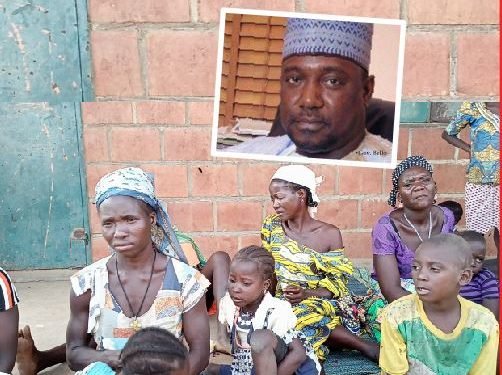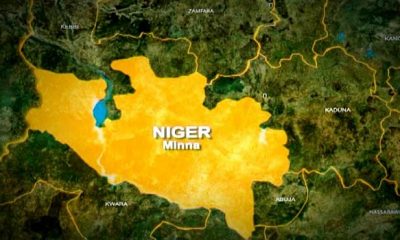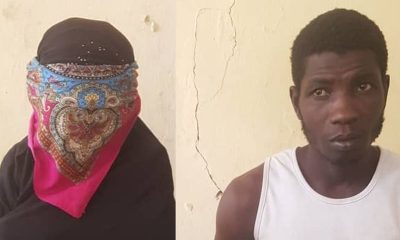News
We are paying ransoms with loans—Niger State residents

– Bandits’ attacks in Niger State have escalated in recent months with deadly cases recorded almost on a daily basis. The bandits attack and ransack villages, abducting the inhabitants for ransoms and subjecting even the women and children to untold horror. The security apparatus appears to be overwhelmed by all this and seems to be losing the battle. JUSTINA ASISHANA visited Munya, one of the most affected local government areas, and reports on the plight of its inhabitants.
Asabe Mathew, a middle-aged woman sat in a pensive mood in front of a classroom at the Internally Displaced Persons (IDP) camp at Central Primary School, Sarkin Pawa, Munya Local Government Area, Niger State gazing intensely at something that only her own eyes could see. She was brooding over the horror she had passed through since the bandits that hold a significant part of Niger State to ransom abducted her daughter and son, forcing her to sell everything she owned to pay for their release.
“They have finished me, as I am now,” she said as her eyes glistened with tears. “I have sold all my farm produce and I have loans to pay because I had to borrow money to pay the ransom for my children abducted by bandits. Now I have absolutely nothing left.”
Recalling how her two children were kidnapped by bandits and how she had to raise money as ransom to redeem them, she said: “My son was kidnapped when he was returning from school, and we were asked to pay one million naira to rescue him. What can I do? I had to pay because if I didn’t, they would kill him. I sold my farm produce, added my salary to the proceeds and also obtain a loan to raise the sum demanded as ransom.
“My daughter was also kidnapped. But that happened before they kidnapped my son. We also had to pay a ransom to rescue her. Right now, I don’t have anything left. It has not been easy for us in Munya.”
But Asabe was not alone in her plight. Mohammed Isah currently has two of his sons in the den of the bandits while he currently stays at the IDP camp at the Central Primary School, Sarkin Pawa. His two sons were taken in a recent attack on his Dangunu community in Munya Local Government Area.
He said: “Yesterday, before I ran to this camp, two of my sons were taken on motorcycles when the thieves came to our village. They have not been released because we do not have money to pay for their release. What they asked for is in millions. Where will I get it from? I cannot go back to the village to take my farm produce and sell because that will be equal to dying.”
The Vice-Chairman of Munya Local Government Council, Hon. Luka Garba, is not left out of the ordeal. Two months ago, he lost his younger brother to the bandits. According to him, his younger brother was a member of the local vigilantes in Kachu village and was killed during an ambush.
Rising spate of insecurity in Munya LG
Munya is a local government area on the border between Niger and Kaduna states. Because it shares border with Kaduna State, many inhabitants of the local government area believe that most of the bandits come from Kaduna to carry out their attacks.
Banditry attacks in Munya Local Government Area began about six years ago and have literally turned the area into a terror zone everyone avoids like leprosy. The bandits make sporadic attacks in villages, maiming, killing and abducting people with reckless abandon.
The situation has crippled socio-economic activities in the local government as the farmers can no longer go to their farms for fear of being attacked. Traders who used to go to the local government area to buy farm produce are no longer turning up, causing revenue generation in the local government to reduce drastically.
On April 21, bandits invaded a military camp in Zazzaga community in the local government area barely two weeks after they attacked the military base in Allawa, Shiroro Local Government Area, killing five soldiers and a mobile policeman and burning down the base before they moved into the communities where they also killed seven people and abducted several others.
The majority of bandit attacks occurring in Munya Local Government Area go unreported because much of the focus is on Shiroro Local Government Area of the state probably because of the latter’s economic importance as the host of one of the country’s major power stations.
The attacks are usually carried out with the aid of motorcycles.
When the reporter visited Munya Local Government’s headquarters two days after the attack in the military camp in Zazzaga community, some women were seen running back from their farms. Asked what the matter was, they said some bandits had invaded their farms and they had to run for dear lives.
One of the women, who identified herself as Louis, said: “We were working on the farm when we saw them coming. We had no option but to run. We had harvested some of the crops, but we could not carry them because we had to run.”
Other Munya residents who spoke with the reporter said that is the way they live now because they can no longer farm in peace in an area where the majority of the people are farmers.
A youth leader, who asked not to be named for security reasons, said that the invaders move like breeze and usually carry out their attacks on new motorcycles.
He said: “They all ride on new motorcycles. That is why before you have the time to react to their invasion, they are by your side. They move like breeze.”
The Vice-Chairman of Munya Local Government Council, Hon. Luka Garba, said that the people in the communities are currently running away from their homes and they are either entering Sarkin Pawa, Gwada and Kuta or running to Minna, Niger State capital, for safety.
“At Kuchi two weeks ago, bandits killed three mobile policemen. They slaughtered one of them with a knife. That is why security has moved from Kuchi to Sarkin Pawa. Even yesterday, they killed one man called Jacob in Zazzagi, then they went to the military camp and burnt the army vehicles and properties,” Garba said.
‘Does government still care about us?’
One question that is constant on the lips of Munya Local Government residents is whether the government is unaware of what is happening to them or simply does not care since there has been no visible effort made by the government to safeguard their lives and properties.
Garba said whenever the chairman of the council takes their complaint to the government they pay deaf ears, adding that the council was overwhelmed with the spate of insecurity.
He asked: “What is the government waiting for? We don’t know what is happening. Does that mean that there is no government or what? As a local government, we are trying our best. As the vice-chairman, I sleep here with my people to know what they are facing. This is more than us. The governments at state and federal levels need to look into this issue.
“Another question we are asking is where are they getting the weapons they use from? Who is providing these guns for them? Is it that the government cannot retrieve these weapons and give them to the security people?”
Asabe Mathew noted that since the insecurity problems began in the council, the people had not felt the presence of government in any way, adding that the government seemed to have abandoned them to their fate.
She said: “Government should look into this security challenge for us. We are suffering and they are supposed to be there for us. Why can’t they help us? If the bandits kill us all, who will they govern? We are the ones who elected them, why are they treating us like this? Why have they abandoned us?
“People are no longer coming here to trade. Government is not helping us to solve this insecurity problem. Are we not human beings? Can’t the government do something to help us?”
Ransom payments have rendered us bankrupt, say residents
Many families in the Munya Local Government Area are currently bankrupt as they have had to sell their farm produce, lands and other forms of property and even obtain loans to pay the ransom for kidnapped loved ones.
Kidnapping incidents in the area have become so rampant that the people no longer ask when the next kidnapping will occur but whose family would be affected. It was learnt that the residents have now hit on the idea of contributing money for anyone whose family member is kidnapped.
The youth leader said: “If they kidnap anyone, we contribute money for those that are kidnapped to enable their families pay for their ransoms and secure the release. If I don’t do it, when it is my turn, no one will join hands to help me. I must help others so that when it is my turn, they will help me.
“You don’t usually hear about small amounts but large ones between one and five million naira. Just one family cannot pay it. A lot of people don’t have any farm produce anymore because they sold them to raise ransoms.”
Garba said that there were currently about 20 women with the bandits and they were asking for N20 million as ransom.
“Presently, we have about 20 women with the bandits and they are asking for N20 million for their release. We are trying our best to raise money for their release,” he said.
Youths to government: Give us the weapons, we’ll face them
The youths in the area expressed their readiness to battle the bandits if they are given weapons. Mathew John, one of the youth leaders, said that the youths do not have the weapon to face the bandits, but if given the weapons, they can defend the council.
He said: “Our youths can take action against these bandits, but they are afraid because we have no weapon to face them. However, if given the weapon, we are ready to defend ourselves. But we cannot go there with catapults. We can’t face them with sticks or cutlasses. This suffering is too much.”
Garba is in support of the idea that security agencies equip the youths in the council to help in securing it, saying: “I will support the youths if they want to defend the council because I am telling you that this suffering is too much. Anyone who is not here cannot feel what we are feeling.
“I can tell you sincerely that if we have weapons, we would face these criminals. But the security agencies always have a problem with us mentioning rifle or guns, and the moment you hold a rifles or gun in public, they will start challenging you.
“That is why they are killing us anyhow because we have no weapon to face them.”
Churches, mosques deserted
In the past four months, it was learnt that four churches in the local government area have been burnt while Christians and Muslims have become scared to gather for worship in the villages. According to Garba, the Christians suffer it more as the bandits attack churches on Sundays, pursue and shoot at worshippers.
He said: “At Dongulu, they burnt a church to ashes. They also burnt the Cherubim and Seraphim Movement Church in Kampana. They destroyed another church in Tantana. In all, they have burnt about three churches.
“Anytime these bandits see people worshipping on Sunday, they will come and surround the church, pursue the people and shoot at them. How can we worship God when there is no peace in Munya?
“In terms of religion, they are disturbing us because most of these people in the communities affected cannot worship God properly.”
Musa Luka, another youth leader, said that the churches burnt were up to five.
Munya is known to be one of the top producers of yam, corn and rice in Niger State and its markets were highly patronised before the banditry attacks. However, this has changed as the markets are no longer full like before while the majority of the farmers no longer have farm produce to sell. Others have to take their produce to Minna, the state capital.
A female farmer, Martha Egbe, recalled that people used to come to their farms in the past to buy crops even before they were harvested, but now, it is hard to get a buyer as everyone cites insecurity as the reason why they cannot go to Munya.
Asabe, stating the difficulty in selling her crops, said: “I have to take my goods to Minna because people have refused to come because of insecurity. It has affected the sales of our goods. Sometimes, getting transportation to Minna is a problem because some of the vehicles will refuse to carry your goods or they will charge extravagant fees.
“People are no longer coming here. They are scared of being caught up in bandit attacks. But we that are here are human beings. We have goods to sell and need people to come. We cannot go anywhere because this is our fatherland.”
IDPs seek government’s help to return home
The Internally Displaced Persons (IDPs) at the Central Primary School in Sarkin Pawa have cried out for hunger and are seeking government’s help to return home. They are also seeking help for their children and relatives who have been kidnapped by the bandits who are demanding ransoms they cannot afford.
Ladi Shehu, a farmer from Geshu, said that they left their village for Zazzaga, and after the Zazzaga attack, they had to move to Sarkin Pawa.
Shehu said: “The bandits chased us out of our homes and we cannot return home because going back is like inviting death. We are not happy to be here. We have no food here, and in our home where there is food, we cannot go there to get the food. Our children are not feeding well.”
Another IDP said the bandits kidnapped their children and killed their young men and husbands, adding that they did not know what to do since the government has refused to come to their aid.
He said: “If the government would come and end this problem, we will be okay. If these bandits are no more here, we will be able to stay in our communities and live normally.
“It is sad that we have not got anything from the government apart from this building we are given to stay in. The government has not done anything for us, and we want them to act.”
Isah Mohammed, a native of Dangunu community, said that all they need is security as their community has been repeatedly attacked by bandits.
“We are managing here. We have food problem here whereas in our homes, we have no such problem. We are not enjoying ourselves here. We need security to return to our homes.”
Calls heighten for declaration of state of emergency
Various people across Niger State have called on the state government to declare a state of emergency in the Niger East Senatorial Zone which has been taken over by bandits. Top among the voices is the lawmaker representing Bosso Constituency in the state House of Assembly, Hon. Madaki Malik Boss.
Boss said the declaration of a state of emergency will enable the government to tackle the insecurity problem bedeviling the zone. Bosso, who visited the IDP camps, explained that insecurity in the zone was getting worse by the day and had spread to most of the local government areas in the zone.
He noted that all the schools in the zone had been turned into camps for internally displaced persons (IDPs), lamenting that the people could no longer sleep with their eyes closed.
– The Nation
News
Just in: Factional Zamfara assembly leaders want governor to represent budget

Just in: Factional Zamfara assembly leaders want governor to represent budget
A factional House of Assembly has emerged in Zamfara state with members demanding the re-presentation of the 2025 Appropriation Bill by Governor Dauda Lawal.
The group, made up of nine lawmakers who were suspended in February 2024 over allegations of misconduct, conspiracy, and illegal sitting, convened in Gusau, the state capital, and declared the formation of a parallel legislative body.
At the session, the lawmakers elected Hon. Bashir Aliyu Gummi as Speaker of the factional assembly.
During the sitting, the faction addressed several issues, including the state’s deteriorating security situation, economic challenges, and the recent reports of mass sackings within the state civil service allegedly carried out by the Lawal administration.
READ ALSO:
- 2027: Atiku remains the best to face Tinubu, says Dele Momodu
- NLC to IMF: Your reforms inflict hunger, poverty on masses
- Nigerians deserve truth about electricity, not propaganda, labour slams power minister
The group further demanded that Governor Lawal re-present the 2025 budget, arguing that the process followed in its initial passage was flawed. The governor had originally submitted the N545 billion Appropriation Bill to the widely-known State House of Assembly led by Speaker Bilyaminu Ismail Moriki in December 2024. The bill was passed and signed into law that same month.
Present at Wednesday’s session were Hon. Aliyu Ango Kagara (Talata Mafara South), Ibrahim Tudu Tukur (Bakura), Nasiru Abdullahi Maru (Maru North), and Faruk Musa Dosara (Maradun 1). Others included Bashar Aliyu (Gummi 1), Bashir Abubakar Masama (Bukkuyum North), Amiru Ahmed (Tsafe West), Basiru Bello (Bungudu West), and Mukhtaru Nasiru (Kaura Namoda North).
Just in: Factional Zamfara assembly leaders want governor to represent budget
News
NLC to IMF: Your reforms inflict hunger, poverty on masses

NLC to IMF: Your reforms inflict hunger, poverty on masses
The Nigeria Labour Congress (NLC) has taken a swipe at the International Monetary Fund (IMF) over its policy proposals to Nigeria and other African nations on how to rejuvenate their ailing economies.
Indeed, the NLC pointedly told the IMF that its conditionalities for giving loans to Nigeria and others were inflict pains of hunger and poverty on the masses.
The NLC President, Joe Ajaero, stated this when he received the IMF team team comprising the its Resident Representative for Nigeria, Christian H. Ebeke, and, Axel Schimmelpfennig from Washington, DC.
The purpose of the visit, it was learnt, was to assess how Nigerian workers and the general populace are being affected by the current socioeconomic environment and the hardship resulting from government policies.
The IMF delegation, led by Schimmelpfennig also sought insights from the NLC regarding the state of the labour market in Nigeria. According to them, the information gathered would contribute to the IMF’s annual country report for Nigeria.
Sources at the meeting disclosed that the IMF team acknowledged that the Nigerian government has been grappling with fiscal challenges since assuming office.
They emphasized that the IMF’s recommendations are purely advisory and not mandatory, based on the prevailing realities in each country.
The delegation expressed concern that, often, governments do not follow the IMF’s recommendations to the letter, instead adapting them to align with political objectives. In effect, the IMF attempted to distance itself from the adverse consequences of some recent economic reforms in Nigeria.
READ ALSO:
- Nigerians deserve truth about electricity, not propaganda, labour slams power minister
- INEC may allow Nigerians without PVCs to vote in 2027
- Air Peace suspends flights over NIMET strike
Nevertheless, the IMF team requested continued engagement with the NLC going forward.
Ajaero made it clear that governance should prioritize citizens’ welfare over profit-making.
News
‘Enough is enough’, Tinubu directs security chiefs to stop violent attacks

‘Enough is enough’, Tinubu directs security chiefs to stop violent attacks
President Bola Tinubu has ordered security operatives to end forthwith the violent attacks in some parts of the country, especially in Plateau, Borno, and Benue states.
He gave the directive during a meeting with security chiefs at the State House on Wednesday.
The meeting was attended by Nuhu Ribadu, the national security adviser (NSA); Mohammed Mohammed, director-general of the National Intelligence Agency (NIA); Emmanuel Undianeye, chief of defence intelligence; Oluwatosin Ajayi, director-general (DG) of the Department of State Services (DSS); and Femi Gbajabiamila, chief of staff (CoS) to the President.
Speaking with journalists after the meeting, Ribadu said Tinubu declared that “enough is enough” on the resurgence of violence in some parts of the country.
The NSA said the president directed security chiefs to work with the political authorities in states and at the grassroots level to find a lasting solution to the insecurity.
He said the security chiefs had acted on Tinubu’s previous instructions by meeting with political leaders in the affected communities and states.
The NSA said the meeting offered the security chiefs the opportunity to fully brief the president about the current security situation of the country.
“This time, we were able to sit with him for hours and give a proper briefing. We also took new instructions from him,” he said.
“Insecurity is not only a government problem.
“It also involves the subnational units — the communities, local governments, and especially the governors. The president directed that we work more closely with them.
“Some of these problems are community-related. While not entirely so, that element plays a significant role.
“Mr. President is working hard to ensure that Nigeria enjoys peace and stability. We are not relenting. We will not stop until we get the results he demands.”
On the resurgence of violent attacks in Borno, Ribadu said the terrorists were planting explosives during the period of relative peace in the state.
“This enemy does not give up easily. When there’s peace for a long time, they try to shock the public with an isolated incident,” he said.
The NSA said the security situation in the country is not yet at 100 percent, while noting that there is “significant improvement”.
Since the beginning of the month, many have been killed in some communities in Plateau State.
Benue State has also recorded violent attacks as over 50 people were killed in Ukum and Logo LGAs on April 18.
-

 metro2 days ago
metro2 days agoRivers: Tinubu meets with Fubara, may lift his suspension
-

 metro2 days ago
metro2 days agoBring your children to compete with mine, MC Oluomo challenges those mocking his spoken English
-

 metro1 day ago
metro1 day agoI’m not in supremacy battle with Ooni, says new Alaafin
-

 News3 days ago
News3 days agoTinubu returns to Nigeria after France, UK trip
-

 metro3 days ago
metro3 days agoAnsar-Ud-Deen Society of Nigeria elects new leaders, Tinubu praises educational contributions
-

 Business2 days ago
Business2 days agoMarketers count losses as NNPC slashes petrol price
-

 metro2 days ago
metro2 days agoRivers: Fubara’s supporters praise Tinubu’s intervention with emergency rule
-

 metro2 days ago
metro2 days agoBandits attack Kwara North, kill vigilante, six others













